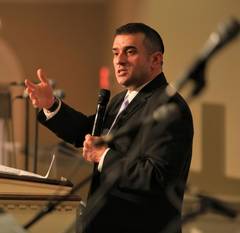- About Us
- Learning
- Resources
- Get Involved
- Membership
- Jobs
Parshat Miketz
12/01/2021 12:52:13 PM
Rabbi Brent Spodek
| Author | |
| Date Added | |
| Automatically create summary | |
| Summary |
 For the ancient rabbis, famine was worse than war: while the sword is quick, hunger kills slowly and painfully. Yet despite famine’s early warning signs, many governments, both ancient and modern have failed to plan for food crises. As a result, millions have been left dead. In many cases, food is locally available where people are starving, but government ineptitude or cruelty prevents it from getting to those in need.
For the ancient rabbis, famine was worse than war: while the sword is quick, hunger kills slowly and painfully. Yet despite famine’s early warning signs, many governments, both ancient and modern have failed to plan for food crises. As a result, millions have been left dead. In many cases, food is locally available where people are starving, but government ineptitude or cruelty prevents it from getting to those in need.
In 1943, for instance, more than three million civilians died of famine in Bengal while the British occupying force diverted available crops to storehouses for soldiers. In 1973, more than 300,000 people died of famine in the Wollo region of Ethiopia while food was shipped out of the region to the capital city of Addis Ababa, where people had money to buy food.
But while millions of people have lost their lives due to political failures during times of famine, the first governmental response to famine, recorded in Parshat Miketz, was a resounding success for three key reasons.
First, Joseph correctly interpreted Pharaoh’s dream of the fat cows eating the lean cows to be a sign that seven years of plenty would be followed by seven years of famine. While famine forecasting technology has changed considerably from analyzing dreams to evaluating demographic patterns and weather trends, accurate interpretations of the early signs is essential. It would have been very easy for Joseph to misread this ancient “early warning system” as we do well into the 2st century. In 2005, nearly a quarter of a million people died of starvation in Niger, despite many early warning signs that famine was imminent. As Nobel Prize winning economist Amartya Sen has shown, famine rarely comes as a surprise.
Second, Joseph took advantage of Egypt’s years of plenty to prepare for the future. In a time when famines were seen as acts of God, Joseph persuaded Pharaoh not to surrender to the vagaries of nature, but to take action for times of shortage by storing grain during the good years.
In his final move, Joseph made the not-so-obvious choice to feed everyone – not just the elites. A lesser man might have told Pharaoh that the first and most important step was to ensure that there was enough food for him and his court, and perhaps after that, to address the needs of the population. Yet Joseph was able to harness the absolute power of Pharaoh’s dictatorship to prepare the whole country for catastrophe. When the poor cried out to Pharaoh for bread, Joseph, acting on behalf of the state, was in a position to provide for them.
Yet, despite all these triumphs, Joseph’s legacy remains tainted. By accepting Pharaoh’s totalitarian regime, Joseph failed to develop a political infrastructure that could reliably prevent famine in future generations. Joseph could have told Pharaoh that planning for the well-being of his people wasn’t an act of loving-kindness, but rather the fulfillment of a responsibility to both God and to the people. While Joseph did an incredible job of preventing suffering from within an oppressive system, he did not work to change the system, a failure which came back to haunt his descendants when the Israelites were put into slavery.
Throughout history, total authorities like Pharaoh have more frequently enriched themselves and their allies than they have addressed the needs of the general population. Joseph, who is said to have embodied the Divine Spirit his entire life, ensured that the power of this Egyptian dictator was used to provide for all the people of the land. The Egyptians who lived under this Pharaoh were lucky, though even they had no guarantees that the government would provide them with food. Citizens of democracies, however, can expect those guarantees. Famines have rarely, if ever occurred in independent democratic countries, because in those countries, the media and opposition political parties are vigilant and seize upon the first reports of food shortages. This puts democratic governments under immense pressure to act effectively when faced with a threat of famine.
If everyone who was threatened with starvation today could trust that their leaders were as caring and responsible as Joseph, if they could rest easy knowing their dictators would use the power of the state to help them, then perhaps democracy could be seen as a luxury for the satiated section of the world. But until that impossibly messianic moment, the most important step towards eliminating famine is ensuring that governments, through a vigorous democratic process, are held accountable to the vulnerable people who rely on them.
Thu, December 4 2025
14 Kislev 5786
RABBI BRENT SPODEK

Join Our Mailing List
Privacy Settings | Privacy Policy | Member Terms
©2025 All rights reserved. Find out more about ShulCloud


